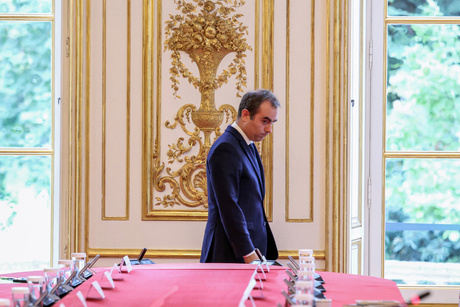French PM suspends controversial pension reform to avoid government collapse

French Prime Minister Sébastien Lecornu said Tuesday he will propose suspending a controversial plan to raise the retirement age from 62 to 64, in a move aimed at preventing his fragile minority government from being toppled.
After a week of intense political turmoil, the newly reappointed Lecornu said Tuesday in a policy speech at the National Assembly that the law, a flagship policy of French President Emmanuel Macron, would be put on hold until after the next presidential election, to be held in 2027.
The Socialist Party, which is not part of the governing coalition, had demanded the law be repealed, and Lecornu's offer to suspend it was seen as a prerequisite for the Socialists' potential support.
On Thursday, Lecornu will faces two no-confidence motions one from the hard-left France Unbowed and the other from the far-right National Rally. The two parties do not hold enough seats to topple Lecornu's government on their own, but the prime minister could quickly be undone if the Socialists and others on the left join forces with them.
"I will propose to Parliament, starting this autumn, that we suspend the 2023 pension reform until the presidential election," Lecornu said. "No increase in the retirement age will take place from now until January 2028."
Lecornu said the suspension would cost 400 million euros ($463 million) in 2026, and 1.8 billion euros in 2027. He said it will benefit 3.5 million French citizens.
"It will therefore have to be financially compensated, including through cost-saving measures. It cannot be carried out at the expense of an increased deficit," he said.
France's deficit hit 5.8% of gross domestic product last year, way above the official EU target of 3%. France is also facing a massive debt crisis. At the end of the first quarter of 2025, France's public debt stood at 3.346 trillion euros, or 114% of GDP.
Concessions required
Earlier on Tuesday, Lecornu met with his cabinet to discuss the 2026 budget, which must be approved by year's end. He said the main objective would be to bring the deficit below 5% of GDP to safeguard France's sovereignty, stressing the need for fiscal discipline and structural savings.
Among the measures under consideration are cutting red tape, fighting social and tax fraud, targeted tax cuts for small and medium-sized businesses, and exceptional contributions from large corporations.
Lecornu also confirmed that he would not use a special constitutional power to force the budget through parliament without a vote, and would instead seek a compromise with lawmakers.
With his government hanging by a thread, France's newly reappointed prime minister must make concessions to his political opponents.
The opposite sides of the political spectrum have slammed Macron's decision to reappoint Lecornu, France's former defense minister and fourth prime minister in barely a year.
With less than two years before the next presidential election, National Rally is urging Macron to call another early parliamentary vote while France Unbowed wants Macron to step down.
Rammed through parliament without a vote in 2023 despite mass protests, the pension change gradually raises the retirement age from 62 to 64. Opposition parties want it scrapped.
Those calling for the law to be suspended have gained a high-profile ally. Nobel Prize-winning economist Philippe Aghion told broadcaster France 2 that it should be suspended until 2027.
"I think we need to stop the clock now until the presidential election," Aghion said, arguing that doing so would be "the way to calm things down" and "it doesn't cost very much to pause it."
Macron's last chance
Lecornu's reappointment is widely seen as Macron's last chance to reinvigorate his second term. His centrist camp lacks a majority in the National Assembly and he is facing increasing criticism even within its ranks.
Macron's surprise decision last year to dissolve the National Assembly resulted in a hung parliament and political paralysis.
Over the past year, Macron's successive minority governments have collapsed in quick succession, leaving France mired in deadlock while confronting a rising poverty rate and a mounting debt crisis that has alarmed markets and EU partners.



